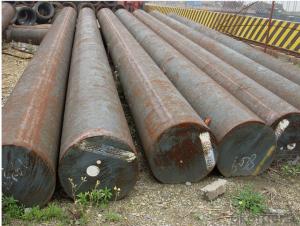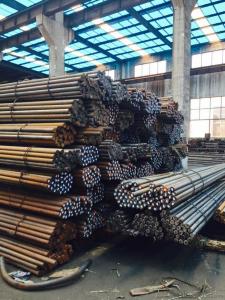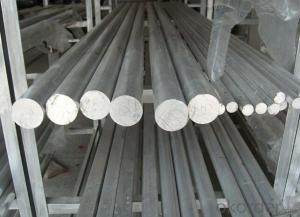Special Steel 1.2631 Round Steel / A8 Tool Steel Round Bar
- Loading Port:
- China main port
- Payment Terms:
- TT or LC
- Min Order Qty:
- 25 m.t.
- Supply Capability:
- 10000 m.t./month
OKorder Service Pledge
OKorder Financial Service
You Might Also Like
Item specifice
The details of our Steel
1. Produce Standard: as the GB, AISI, ASTM, SAE, EN, BS, DIN, JIS Industry Standard
2. Produce processes: Smelt Iron -EAF smelt Billet - ESR smelt Billet -Hot rolled or forged get the steel round bar and plate
3. Heat treatment:
Normalized / Annealed / Quenched+Tempered
4. Quality assurance:
All order we can received Third party inspection, You can let SGS, BV,.. and others test company test and inspect our products before Goods shipping.
Product information
Chemical Composition(%) of A8 steel round bar | C | Si | Mn | S | P | Cr | Mo | V |
0.90-1.05 | 0.20-0.40 | 0.40-0.70 | ≤0.035 | ≤0.035 | 4.80-5.50 | 0.90-1.20 | 0.10-0.30 | |
Specification of A8 steel round bar | Dia.*L=14~50mm*2000~5000mm | |||||||
Characteristic of A8 steel round bar | 1.good machinability and abrasivity 2.good hardness | |||||||
Application of A8 A8 steel round bar | 1.Precision Stamping Dies 2.Precison Blanking Dies of wire cutting process, and stamping dies for various uses 3.Tools for plactic deformation of hard processing material 4.Dies for forging, deep drawing and thread rolling 5.High speed blanking punch,stainless plates punch 6.Tensile modulus, crimping die, embossing dies, wear plastic molding mold | |||||||
Heart Treatment of A8 steel round bar | 1.Quench: 940-960°c oil cooling 2.Tempering temperature: 210~240 °C 3. Hardness: 61HRC | |||||||
Melting Process of A8 steel round bar | 1. EAF: Electric Furnace+LF+VD(Optional) 2. ESR: Electric Furnace+LF+VD+Eleroslag Remelted(Optional) | |||||||
Payment Term of A8 steel round bar | L/C or T/T, 30% in advance, 70% before the shipment | |||||||
Main product
Plastic Mould Steel
DIN 1.2311,1.2738,1.2083,1.2316 etc.
AISI P20,P20+Ni,420 etc.
JIS SUS420J2
Hot Work Steel
DIN 1.2344,1.2343,1.2367,1.2365,1.2581,1.2713 etc.
AISI H13,H11,H10,H21, etc.
JIS SKD61,SKD6,SKD5,SKT4 etc.
Cold Work Steel
DIN 1.2739, 1.2601, 1.2080, 1.2436, 1.2631, 1.263, 1.2510, 1.2327 etc.
AISI D2, D5, D3, D6, A8, A2, O1 etc.
JIS SKD10, SKD11, SKD1, SKS3 etc.
High Speed Steel
DIN 1.3343, 1.3243, 1.3247, 1.3355 etc.
AISI M2, M35, M42, T1 etc.
JIS SKH51, SKH35, SKH59, SKH2 etc.
Alloy Structural Steel
DIN 1.7035,1.6511,1.7220,1.7225 etc.
AISI 5140, 4340, 4135, 4140 etc.
JIS SCr440,SNCM439,SCM435,SCM440 etc.
Stainless & Carbon Steel or Others
DIN 1.4125,1.1191 etc
AISI 440C,1045, 1020 etc.
JIS SUS440C,S45C etc
Product show

Workshop show

Shipping
1. FedEx/DHL/UPS/TNT for samples, Door-to-Door;
2. By Air or by Sea for batch goods, for FCL; Airport/ Port receiving;
3. Customers specifying freight forwarders or negotiable shipping methods!
Delivery Time: 3-7 days for samples; 5-25 days for batch goods.
Payment Terms
1.Payment: T/T, L/C, Western Union, MoneyGram,PayPal; 30% deposits; 70% balance before delivery.
2.MOQ: 1pcs
3.Warranty : 3 years
4.Package Informations: 1) EXPORT, In 20 feet (GW 25 ton) or 40 feet Container (GW 25 ton)
2)as customer's requirement
Why choose us?
(1) The leading exporter in China special steel industry.
(2) Large stocks for various sizes, fast delivery date.
(3) Good business relationship with China famous factories.
(4) More than 7 years steel exporting experience.
(5) Good after-sales service guarantee.
- Q:What are the machining techniques for special steel?
- There are several machining techniques that can be used for special steel, including turning, milling, drilling, and grinding. These techniques involve using specialized tools and equipment to shape and remove material from the steel in order to achieve the desired dimensions and surface finish. Additionally, heat treatment processes such as annealing or tempering may be applied to further enhance the properties of the special steel after machining.
- Q:What are the different medical grades of special steel?
- Medical steels are classified into different grades based on their unique properties and characteristics in the medical field. These grades are specifically tailored to meet the strict requirements of medical applications, including surgical instruments, implants, and medical devices. Some well-known medical grades of special steel include: 1. Stainless Steel: The most commonly used medical grade of special steel is stainless steel, renowned for its exceptional corrosion resistance and biocompatibility. It contains high levels of chromium and nickel, which provide corrosion resistance and make it suitable for implants and surgical instruments. 2. Titanium Alloys: Lightweight yet strong, titanium alloys are ideal for medical applications like orthopedic and dental implants, as well as cardiovascular devices. These alloys are highly biocompatible and exhibit excellent resistance to corrosion and fatigue, ensuring long-term durability. 3. Cobalt-Chromium Alloys: Cobalt-chromium alloys possess exceptional strength, wear resistance, and stability at high temperatures, making them suitable for implantable devices such as hip and knee replacements. They offer excellent biocompatibility and strike a good balance between strength and flexibility. 4. Nitinol: Nitinol, composed of nickel and titanium, is a shape memory alloy with unique properties like superelasticity and shape memory effect. Its excellent biocompatibility and ability to adapt to different physiological conditions make it commonly used in medical devices such as stents, orthodontic wires, and vascular closure devices. 5. High Carbon Stainless Steel: High carbon stainless steel is a specialized grade used in surgical instruments that require exceptional sharpness, hardness, and wear resistance. This grade allows for the production of extremely fine and precise cutting edges, making it suitable for delicate procedures. These are just a few examples of the medical grades of special steel utilized in the healthcare industry. Each grade offers specific advantages depending on the intended application, and their selection is crucial to ensure optimal performance, biocompatibility, and patient safety.
- Q:What are the main alloying elements in special steel?
- The main alloying elements in special steel can vary depending on the specific type or grade of steel. However, some common alloying elements found in special steel include chromium, nickel, molybdenum, vanadium, tungsten, and cobalt. These alloying elements are added to steel to enhance its properties such as corrosion resistance, strength, hardness, and heat resistance. Each alloying element has its own unique effect on the steel, allowing for the creation of specialized steel grades for various applications in industries such as aerospace, automotive, oil and gas, and construction.
- Q:What are the different forging techniques for special steel parts?
- There are several forging techniques that can be used for special steel parts, including open die forging, closed die forging, and ring rolling. Open die forging involves shaping the steel by repeated hammering or pressing between flat dies, allowing for a range of shapes and sizes. Closed die forging, on the other hand, utilizes specially designed dies to shape the steel into a specific form, resulting in higher precision. Ring rolling involves shaping a circular piece of steel into a seamless ring by applying pressure from radial rolls. These techniques offer varying advantages depending on the desired shape, size, and properties of the special steel part being forged.
- Q:What are the mechanical properties of special steel?
- Special steels, also known as alloy steels, possess enhanced mechanical properties compared to regular carbon steels. These properties vary depending on the specific alloying elements and their concentration. Some common mechanical properties of special steel include: 1. High tensile strength: Special steels are known for their exceptional strength, making them suitable for applications that require high load-bearing capacity. The tensile strength of these steels can range from 500 MPa to over 2,000 MPa, depending on the composition. 2. Improved hardness: Alloying elements in special steels can significantly increase their hardness. This property is desirable for applications that require resistance to wear and abrasion. Special steels can achieve hardness levels ranging from 200-600 HB (Brinell hardness), depending on the specific alloy composition and heat treatment. 3. Good toughness: Special steels often exhibit good toughness, which refers to the ability to absorb energy before fracturing. This property is crucial for components subjected to impact or dynamic loading. The combination of high strength and toughness makes special steels suitable for demanding applications such as automotive parts or industrial machinery. 4. Excellent fatigue resistance: Special steels are designed to withstand cyclic loading without failure. They exhibit enhanced fatigue resistance, allowing them to endure repeated stress cycles without compromising their structural integrity. This property makes special steels ideal for critical components in aerospace, automotive, and machinery industries. 5. Superior corrosion resistance: Depending on the alloy composition, special steels can offer improved corrosion resistance compared to regular carbon steels. The addition of elements like chromium, nickel, or molybdenum helps to form protective oxide layers on the surface, preventing corrosion and increasing durability. 6. High temperature resistance: Some special steels are specifically formulated to perform well at elevated temperatures. They possess excellent heat resistance and can retain their mechanical properties even at extreme temperatures. This property is crucial for applications such as turbine blades, exhaust systems, or high-temperature furnaces. It is important to note that the specific mechanical properties of special steel can vary widely depending on the specific alloy composition, heat treatment, and processing techniques used. Therefore, it is essential to consult the material specifications or consult with experts to determine the exact mechanical properties of a particular special steel.
- Q:How does special steel perform at high temperatures?
- Special steel performs well at high temperatures due to its unique composition and properties. It exhibits excellent strength, corrosion resistance, and thermal stability, enabling it to retain its mechanical properties even at elevated temperatures. Additionally, special steel has low thermal expansion, ensuring dimensional stability even under extreme heat. These characteristics make it ideal for applications in industries such as aerospace, oil and gas, and power generation, where high temperatures are commonplace.
- Q:What are the environmental benefits of using special steel?
- Special steel, also known as stainless steel, offers numerous environmental benefits. Firstly, it is highly durable and long-lasting, resulting in reduced waste and resource consumption over time. Additionally, stainless steel is 100% recyclable, allowing it to be repurposed indefinitely without any loss in quality. This recycling process requires significantly less energy compared to the production of new steel, leading to a considerable reduction in carbon emissions and environmental impact. Moreover, special steel is corrosion-resistant, eliminating the need for frequent replacements and reducing the use of resources and energy associated with maintenance. Overall, the environmental benefits of using special steel include decreased waste generation, lower energy consumption, reduced carbon emissions, and increased resource efficiency.
- Q:Is special steel suitable for structural applications?
- Yes, special steel is well-suited for structural applications. This type of steel is engineered to possess specific properties and characteristics that meet the demands of various applications. Industries such as construction, automotive, aerospace, and oil and gas often rely on special steel. The outstanding strength, durability, and resistance to corrosion of special steel make it an ideal material for structural applications. It can withstand heavy loads, high temperatures, and extreme weather conditions, ensuring the safety and longevity of structures. Furthermore, special steel offers excellent weldability, machinability, and formability, allowing for flexibility in design and construction. It can be easily shaped, fabricated, and assembled into various structural components, making it suitable for complex and unique projects. Moreover, special steel comes in a wide range of grades and types, each tailored to meet specific structural requirements. These include carbon steel, alloy steel, stainless steel, and tool steel, among others. This versatility enables engineers and designers to select the most suitable type of special steel for their specific application, ensuring optimal performance and cost-effectiveness. In conclusion, special steel is highly suitable for structural applications due to its exceptional strength, durability, resistance to corrosion, and design flexibility. The wide range of grades and types available allows engineers and designers to choose the most appropriate material for their specific project requirements.
- Q:What are the specific requirements for special steel used in the food processing industry?
- The food processing industry has strict requirements for special steel due to its critical nature and the need for high levels of hygiene and safety. Some key requirements for special steel in this industry are as follows: 1. Excellent corrosion resistance: Special steel must be able to withstand exposure to food products, cleaning agents, and moisture without corroding. This is important to prevent contamination and ensure the longevity of equipment. 2. Hygienic design: Steel used should have a smooth and non-porous surface to prevent the accumulation of food particles, bacteria, and other contaminants. It should also be easy to clean and sanitize to maintain hygiene. 3. Non-reactivity: The steel should not react with food products, particularly acidic or alkaline items, to avoid any changes in taste or quality. 4. High temperature resistance: Special steel should be able to withstand high temperatures during cooking, sterilization, and baking processes without any adverse effects on the food or equipment. 5. Sufficient mechanical strength: The steel should have enough strength to withstand the stresses and strains of food processing operations, such as impacts and vibrations, without deforming or breaking. 6. Compliance with food safety regulations: Special steel must meet relevant food safety regulations and standards. It should be free from harmful substances that can leach into the food, such as lead and cadmium. 7. Traceability: Special steel used in the industry should be traceable with proper documentation and certification to ensure its origin and quality. This helps maintain transparency and accountability in the supply chain. These requirements ensure that special steel used in the food processing industry meets the highest standards of quality, hygiene, and safety, protecting consumers' health and maintaining the integrity of food products.
- Q:What are the challenges in working with special steel?
- Working with special steel presents several unique challenges compared to working with regular steel. Here are some of the main challenges one may encounter when working with special steel: 1. High cost: Special steels often have higher production costs due to their unique composition and properties. The raw materials used in their production may be rare or require complex manufacturing processes, leading to increased costs. 2. Limited availability: Special steels are not as widely available as regular steels, making it more challenging to source them. This limited availability can lead to longer lead times and potentially higher costs when trying to procure the necessary materials. 3. Complexity in machining: Special steels can be difficult to machine due to their high hardness or toughness. Their unique properties may cause excessive tool wear, leading to increased machining time and costs. Specialized cutting tools and machining techniques may be required to overcome these challenges. 4. Heat treatment requirements: Special steels often require precise and specific heat treatment processes to achieve the desired mechanical properties. The complexity of heat treatment can be a challenge, as it requires careful control of temperature, time, and cooling rates. Improper heat treatment can lead to inconsistent material properties or even material failure. 5. Weldability issues: Some special steels may have poor weldability compared to regular steels. They may be prone to cracking or require preheating and post-weld heat treatment to ensure proper joint integrity. This can add complexity and cost to welding processes. 6. Corrosion resistance: While special steels may possess excellent mechanical properties, they can sometimes be more susceptible to corrosion compared to regular steels. This requires additional measures to protect the steel from corrosion, such as applying protective coatings or using corrosion-resistant alloys. 7. Knowledge and expertise: Working with special steels often demands a higher level of technical knowledge and expertise. The unique properties and characteristics of these materials require a deep understanding of their behavior and how to effectively work with them. This may require specialized training or collaboration with experts in the field. Despite these challenges, working with special steel can also offer various benefits, such as superior strength, durability, and performance in specific applications. By understanding and addressing these challenges, engineers and manufacturers can harness the unique properties of special steel to develop innovative and high-quality products.
1. Manufacturer Overview |
|
|---|---|
| Location | |
| Year Established | |
| Annual Output Value | |
| Main Markets | |
| Company Certifications | |
2. Manufacturer Certificates |
|
|---|---|
| a) Certification Name | |
| Range | |
| Reference | |
| Validity Period | |
3. Manufacturer Capability |
|
|---|---|
| a)Trade Capacity | |
| Nearest Port | |
| Export Percentage | |
| No.of Employees in Trade Department | |
| Language Spoken: | |
| b)Factory Information | |
| Factory Size: | |
| No. of Production Lines | |
| Contract Manufacturing | |
| Product Price Range | |
Send your message to us
Special Steel 1.2631 Round Steel / A8 Tool Steel Round Bar
- Loading Port:
- China main port
- Payment Terms:
- TT or LC
- Min Order Qty:
- 25 m.t.
- Supply Capability:
- 10000 m.t./month
OKorder Service Pledge
OKorder Financial Service
Similar products
New products
Hot products
Hot Searches
Related keywords






























